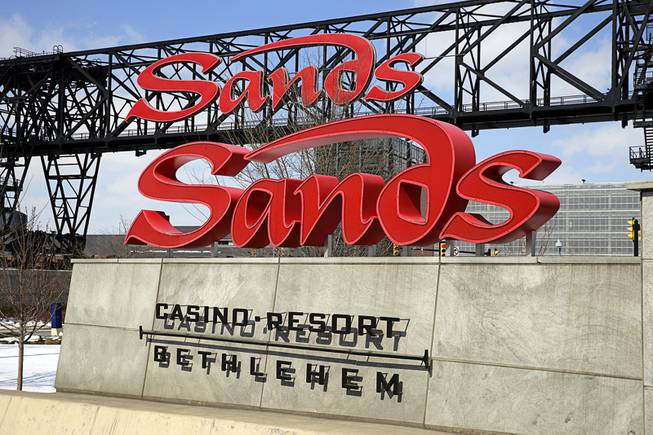
Matt Rourke / AP
Sands Casino Resort Bethlehem is shown Wednesday, Feb. 25, 2015, in Bethlehem, Pa.
Tuesday, July 17, 2018 | 2:22 p.m.
The owner of Sands Casino Resort Bethlehem has filed a petition to conduct casino-style online gambling in Pennsylvania -- but they're really just inquiring for a friend.
Specifically, a cash-flush friend from Alabama in the process of buying the Bethlehem casino for $1.3 billion.
As part of its agreement to sell the Bethlehem casino to Wind Creek Hospitality, Las Vegas Sands Corp. is obligated to pursue "in good faith" a certificate to conduct online gambling in Pennsylvania, according to the footnotes of Sands' petition filed with the state. "Sands submits this petition in the interest of Wind Creek so that, if approved, and after Wind Creek acquires the purchased interests, Sands can conduct interactive gaming in the Commonwealth of Pennsylvania," reads the petition's footnotes, reviewed by The Morning Call.
The property's sale to Wind Creek, slated to close late this year or in early 2019, is the only reason Las Vegas Sands submitted an online gambling petition. The company's Chairman and CEO Sheldon Adelson has been a firm opponent of online gambling all along, and it would be hard to imagine the 84-year-old casino magnate signing off on such a document if the property wasn't being sold.
Sands was one of nine casinos to submit a petition by the end of the day Monday, the deadline to take advantage of a discounted $10 million authorization fee to operate three categories of online casino games: slot machines, table games and poker. The state's remaining casino license holders have until Aug. 14 to submit a petition, but the authorization fee for all three forms of online games jumps to $12 million, or $4 million per category. The Pennsylvania Gaming Control Board must approve or deny a petition for interactive gambling within 90 days of when it is deemed complete, and the authorization fees are due within 60 days of gaining approval.
If any interactive gambling certificates remain, the board can set a timeline for when it would begin accepting applications from qualified out-of-state entities.
It's all part of a massive gambling expansion approved and signed last year, designed to rake in at least $200 million through fees and taxes to help close the state's budget shortfall. Aside from online gambling -- Pennsylvania is the fourth state to allow it -- the expansion also allowed online play for the state's Lottery, which has been dubbed iLottery and has upset the state's existing casinos because the games resemble casino-style games.
The law also set the stage for Pennsylvania to authorize sports betting once a 1992 federal law that limited commercial sports wagering was struck down -- something the Supreme Court did in May. Gaming Control Board spokesman Doug Harbach said the state has not yet received any petitions to conduct sports wagering, so there's no timetable yet as to when the state will record its first legal bet. The state has faced criticism for its planned 36 percent tax on sports wagering -- four times higher than the rate in New Jersey.
Also authorized by the law were video-gambling terminals at qualified truck stops and a brick-and-mortar expansion via the siting of up to 10 mini-casinos across the state. Thus far, there have been five mini-casino auction winners and the state is weighing whether to conduct additional auctions. Sands even tried for a mini-casino near the Ohio border, but that bid was invalidated for being too close to another planned satellite gambling parlor. At first, Sands' bid seemed curious, but a source later confirmed a mini-casino was discussed as part of the company's agreement with Wind Creek.
Now, Sands is acting on behalf of Wind Creek when it comes to online gambling.
If the sale of Sands Bethlehem to Wind Creek is terminated for any reason -- thus far, there's no indication of trouble -- then Sands will "surrender all interactive gaming certificates authorized by the board in connection with this petition, if any, and Sands shall additionally forfeit all interactive gaming authorization fees."
Or, as Las Vegas Sands spokesman Ron Reese put it: "Should for some reason the transaction not go through, our company has no intent of operating any online gaming entities."
What remains unclear is whether Wind Creek will ultimately reimburse Sands for the $10 million online gambling authorization fee once the deal is finalized. Reese could not comment on that.
While Wind Creek has not said whether online gambling played a part in its decision to buy Sands Bethlehem, that provision of the gambling expansion has certainly lured others to make deals in the state. For example, Boyd Gaming Corp. of Las Vegas is acquiring Valley Forge Casino Resort in Montgomery County for $280.5 million, and its President and CEO Keith Smith has pointed to opportunities to drive growth at Valley Forge through the "introduction of new forms of gaming."
The operator of Valley Forge was one of the casinos to file a petition to conduct online gambling.
Still, many believe the online gambling tax rate in Pennsylvania is too high.
Taxes on online games in Pennsylvania will be the same as at land-based casinos: 54 percent on slots and 16 percent on tables. By comparison, neighboring New Jersey taxes gross revenue from Internet gambling at 15 percent.
For Berks County-based Penn National Gaming Inc., which submitted a petition for Hollywood Casino at Penn National Race Course in Dauphin County, it's all about getting a "seat at the table" and continuing to inform the state on the importance of a competitive tax rate for online gambling.
"While we remain disappointed with the state's exorbitantly high tax rate, we decided to proceed with the hope that we can continue to work to bring the tax in line with what other gaming jurisdictions around the world have instituted," said Eric Schippers, Penn National's senior vice president of public affairs.
